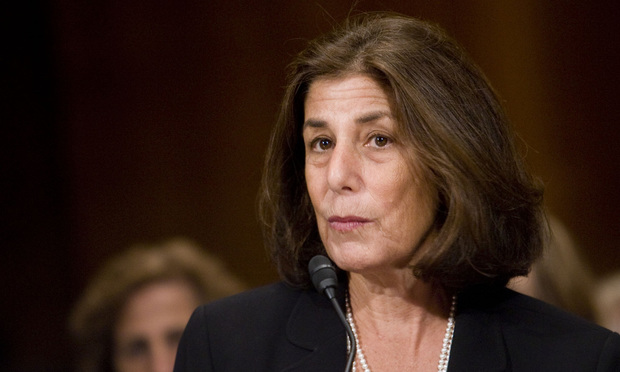Secretary of State Ordered to Review All Provisional Ballots, Postpone Certifying Election
U.S. District Judge Amy Totenberg ordered Georgia's new secretary of state to direct all Georgia counties with more than 100 provisional ballots, including 92 counties that have already certified their results, to "engage in a good faith review" of the eligibility of the voters who cast them. The order could expand the pool of valid ballots that remain to be counted by thousands. She also postponed certification of the midterm election results until as late as Nov. 20 and no earlier than Friday.
November 13, 2018 at 11:10 AM
5 minute read
 Judge Amy Totenberg, U.S. District Court for the Northern District of Georgia. (Photo: Diego M. Radzinschi/ALM)
Judge Amy Totenberg, U.S. District Court for the Northern District of Georgia. (Photo: Diego M. Radzinschi/ALM)
In a late night order, a federal judge in Atlanta on Monday barred Georgia's new secretary of state from certifying the results of Georgia's midterm election on Wednesday and ordered a review of all rejected provisional ballots across the state.
Judge Amy Totenberg of the U.S. District Court for the Northern District of Georgia said in a 56-page order that plaintiff Common Cause Georgia “has shown a substantial likelihood” that then-Secretary of State Brian Kemp's “failure to properly maintain a reliable and secure voter registration system has and will continue to result in the infringement of the rights of the voters to cast their vote and have their votes counted.”
Common Cause was represented by attorneys at the Brennan Center for Justice at New York University School of Law and Paul, Weiss, Rifkind, Wharton & Garrison. The group sought the temporary restraining order on Nov. 5.
Secretary of State spokeswoman Candice Broce said the office is reviewing the order “and considering our options with legal counsel.”
It is the fourth temporary restraining order issued by federal judges in Georgia in the past two weeks that reversed voter registration and ballot policies adopted by Kemp while he was secretary of state. Kemp, who ran for governor on the Republican ticket, on Thursday resigned his post and declared himself the winner over Democrat Stacey Abrams as another federal judge in Atlanta considered whether to issue an order barring him from continuing to oversee or certify the election.
Abrams, who has vowed to make sure every ballot is counted, is seeking as yet uncounted ballots that her campaign says could throw the gubernatorial race into a runoff. On Monday at 5:38 p.m., Kemp led Abrams with 50.26 percent of the vote to Abrams' 48.79 percent. He needs 50 percent plus one vote to win the race outright.
Gov. Nathan Deal appointed attorney Robyn Crittenden to replace Kemp.
Totenberg on Monday ordered that the midterm election—which included a number of still contested races—not be certified before Friday and gave county election officials across the state until Nov. 20 to do so, a date already allowable under state law.
She directed county election superintendents to remit already certified returns by 92 of Georgia's 159 counties with tallies that included 100 or more provisional ballots to “engage in a good faith review of the eligibility of voters issued provisional ballots.”
She also chided the secretary of state for plans to certify the election Wednesday—the same day the county certification results were due “rather than taking any portion of the additional week provided under the law to fully discharge the Secretary's independent duty of review.”
“The Secretary's office early-announced decision to proceed with certification of the vote on the very date of receipt of the county-certified vote returns appears to suggest the Secretary's foregoing of its responsibility to confirm the accuracy of the results prior to final certification, including the assessment of whether serious provisional balloting count issues have been consistently and properly handled,” Totenberg said.
Totenberg also ordered the new secretary of state and the counties to immediately establish and publicize a secure and free-access hotline or website for provisional ballot voters to check whether their provisional ballots were counted and, if not, the reason so that voters have a chance to validate a rejected ballot.
The secretary of state had failed to do so, although federal election laws require it, Totenberg said.
Totenberg cited a higher number of provisional ballots in this election, compared to two previous elections and a string of reported problems involving the state's central voter registration database as the basis for her order.
“The statistical evidence of the increase in the provisional ballot rate for the 2018 general election is of a sufficient degree of significance that the Court can conclude with confidence that the variation was not due to natural fluctuation, but was instead reasonably likely to have been the result of persistent problems and/or errors in the state's voter registration system and ineffective administration of the provisional balloting scheme,” she said.
The order could expand the pool of outstanding valid ballots by thousands. The secretary of state's office has reported that 21,190 provisional ballots were cast. Elections Director Chris Harvey testified at a court hearing last week that only about 50 percent of provisional ballots are likely to be counted.
Kemp has contended that the total number of provisional ballots cast is not enough to trigger a run-off. But, Totenberg said in her order, Common Cause of Georgia “has offered declaration evidence that this may not in fact be the case, and that the provisional ballots may impact the result of the election for other candidates in the general election.”
Myrna Perez, deputy director of the Brennan Center's Democracy Program, said no one should lose the right to vote “because of mistakes in the voter registration database.” Georgia voters “deserve better than what the state wanted to give them,” she said.
“We are all stronger when every eligible voter is allowed to participate in our election,” said Sara Henderson, executive director of Common Cause Georgia.
Read the order:
This content has been archived. It is available through our partners, LexisNexis® and Bloomberg Law.
To view this content, please continue to their sites.
Not a Lexis Subscriber?
Subscribe Now
Not a Bloomberg Law Subscriber?
Subscribe Now
NOT FOR REPRINT
© 2025 ALM Global, LLC, All Rights Reserved. Request academic re-use from www.copyright.com. All other uses, submit a request to [email protected]. For more information visit Asset & Logo Licensing.
You Might Like
View All


Plaintiffs Attorneys Awarded $113K on $1 Judgment in Noise Ordinance Dispute
4 minute read
'Didn't Notice Patient Wasn't Breathing': $13.7M Verdict Against Anesthesiologists
12 minute readTrending Stories
Who Got The Work
J. Brugh Lower of Gibbons has entered an appearance for industrial equipment supplier Devco Corporation in a pending trademark infringement lawsuit. The suit, accusing the defendant of selling knock-off Graco products, was filed Dec. 18 in New Jersey District Court by Rivkin Radler on behalf of Graco Inc. and Graco Minnesota. The case, assigned to U.S. District Judge Zahid N. Quraishi, is 3:24-cv-11294, Graco Inc. et al v. Devco Corporation.
Who Got The Work
Rebecca Maller-Stein and Kent A. Yalowitz of Arnold & Porter Kaye Scholer have entered their appearances for Hanaco Venture Capital and its executives, Lior Prosor and David Frankel, in a pending securities lawsuit. The action, filed on Dec. 24 in New York Southern District Court by Zell, Aron & Co. on behalf of Goldeneye Advisors, accuses the defendants of negligently and fraudulently managing the plaintiff's $1 million investment. The case, assigned to U.S. District Judge Vernon S. Broderick, is 1:24-cv-09918, Goldeneye Advisors, LLC v. Hanaco Venture Capital, Ltd. et al.
Who Got The Work
Attorneys from A&O Shearman has stepped in as defense counsel for Toronto-Dominion Bank and other defendants in a pending securities class action. The suit, filed Dec. 11 in New York Southern District Court by Bleichmar Fonti & Auld, accuses the defendants of concealing the bank's 'pervasive' deficiencies in regards to its compliance with the Bank Secrecy Act and the quality of its anti-money laundering controls. The case, assigned to U.S. District Judge Arun Subramanian, is 1:24-cv-09445, Gonzalez v. The Toronto-Dominion Bank et al.
Who Got The Work
Crown Castle International, a Pennsylvania company providing shared communications infrastructure, has turned to Luke D. Wolf of Gordon Rees Scully Mansukhani to fend off a pending breach-of-contract lawsuit. The court action, filed Nov. 25 in Michigan Eastern District Court by Hooper Hathaway PC on behalf of The Town Residences LLC, accuses Crown Castle of failing to transfer approximately $30,000 in utility payments from T-Mobile in breach of a roof-top lease and assignment agreement. The case, assigned to U.S. District Judge Susan K. Declercq, is 2:24-cv-13131, The Town Residences LLC v. T-Mobile US, Inc. et al.
Who Got The Work
Wilfred P. Coronato and Daniel M. Schwartz of McCarter & English have stepped in as defense counsel to Electrolux Home Products Inc. in a pending product liability lawsuit. The court action, filed Nov. 26 in New York Eastern District Court by Poulos Lopiccolo PC and Nagel Rice LLP on behalf of David Stern, alleges that the defendant's refrigerators’ drawers and shelving repeatedly break and fall apart within months after purchase. The case, assigned to U.S. District Judge Joan M. Azrack, is 2:24-cv-08204, Stern v. Electrolux Home Products, Inc.
Featured Firms
Law Offices of Gary Martin Hays & Associates, P.C.
(470) 294-1674
Law Offices of Mark E. Salomone
(857) 444-6468
Smith & Hassler
(713) 739-1250






